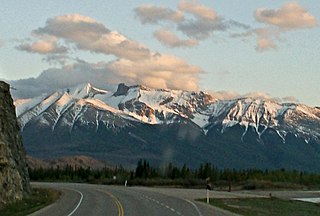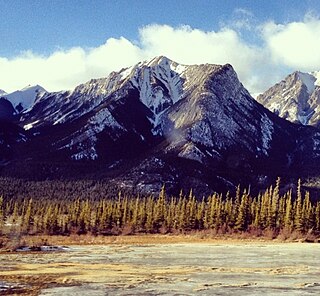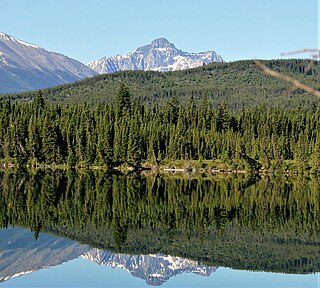
Mount Bridgland is a 2,930-metre (9,610 ft) mountain located in the Victoria Cross Ranges of Jasper National Park in Alberta, Canada. It was named by Frank Sissons in 1923 after Morrison P. Bridgland (1878-1948), a Dominion Land Surveyor who named many peaks in Jasper Park and the Canadian Rockies.

Utopia Mountain is a 2,602-metre (8,537-foot) mountain in the Miette Range of Jasper National Park, in the Canadian Rockies of Alberta, Canada. It was named by Morrison P. Bridgland in 1916. Bridgland (1878-1948) was a Dominion Land Surveyor who named many peaks in Jasper Park and the Canadian Rockies.
Amber Mountain is a 2,565-metre (8,415-foot) mountain summit located in the Maligne Range of Jasper National Park, in the Canadian Rockies of Alberta, Canada. Amber Mountain was so named on account of amber-hued shale outcroppings. The mountain was named in 1916 by Morrison P. Bridgland (1878-1948), a Dominion Land Surveyor who named many peaks in Jasper Park and the Canadian Rockies. The mountain's name was officially adopted in 1947 when approved by the Geographical Names Board of Canada. Its nearest higher peak is The Watchtower, 5.0 km (3.1 mi) to the east. Amber Mountain is composed of sedimentary rock laid down during the Cambrian period and pushed east and over the top of younger rock during the Laramide orogeny.

Angle Peak is a 2,910-metre (9,547 ft) mountain summit located in Jasper National Park, in the Canadian Rockies of Alberta, Canada. Angle Peak was named for the fact it stands where the ridge makes a bend. The descriptive name was applied in 1916 by Morrison P. Bridgland (1878-1948), a Dominion Land Surveyor who named many peaks in Jasper Park and the Canadian Rockies. The mountain's name was made official in 1935 by the Geographical Names Board of Canada. The mountain is situated in the Tonquin Valley, with Angle Glacier on its north slope, Alcove Mountain to its immediate west, The Ramparts 10 km (6.2 mi) to the northwest, and Mount Edith Cavell 12 km (7.5 mi) to the northeast.

Chetamon Mountain is a 2,606-metre (8,550-foot) mountain summit located in Jasper National Park, in the De Smet Range of the Canadian Rockies in Alberta, Canada. The peak is situated 18 kilometres (11 mi) north of the municipality of Jasper, in the Athabasca Valley and is visible from Highway 16 and the Canadian. Its nearest higher peak is Cliff Mountain, 3.5 km (2.2 mi) to the northwest.

Cinquefoil Mountain is a 2,256-metre (7,402 ft) mountain summit located in the Athabasca River valley of Jasper National Park in Alberta, Canada. It is situated in the Jacques Range of the Canadian Rockies. Cinquefoil Mountain was named in 1916 by Morrison P. Bridgland on account of cinquefoil in the area. Bridgland (1878–1948) was a Dominion Land Surveyor who named many peaks in Jasper Park and the Canadian Rockies. The mountain's name was officially adopted in 1928 by the Geographical Names Board of Canada.
Coronach Mountain is a 2,462-metre (8,077 ft) mountain summit located in Jasper National Park of Alberta, Canada. It is situated in the Bosche Range of the Canadian Rockies. The mountain was named in 1916 by Morrison P. Bridgland, who was inspired by the howling of nearby coyotes and applied the name Coronach, the Scottish Gaelic word for funeral dirge. Bridgland (1878–1948) was a Dominion Land Surveyor who named many peaks in Jasper Park and the Canadian Rockies. The mountain's name was officially adopted in 1956 by the Geographical Names Board of Canada. Its nearest higher peak is Mount Aeolus, 3.5 km (2.2 mi) to the north.
Mount Cumnock is a 2,438 m (7,999 ft) mountain summit located in Jasper National Park of Alberta, Canada. It is situated in the De Smet Range of the Canadian Rockies. Mount Cumnock was named in 1916 by Morrison P. Bridgland after Cumnock, in Scotland. Bridgland (1878-1948) was a Dominion Land Surveyor who named many peaks in Jasper Park and the Canadian Rockies. The mountain's name was officially adopted in 1956 by the Geographical Names Board of Canada. Its nearest higher peak is Mount Haultain, 7.5 km (4.7 mi) to the west.

Gargoyle Mountain is a 2,693-metre (8,835-foot) mountain summit located in Jasper National Park, in the Canadian Rockies of Alberta, Canada. The peak is situated 23 kilometres north of the municipality of Jasper, and is a prominent landmark in the Athabasca Valley visible from Highway 16 and The Canadian. Its nearest higher peak is Cliff Mountain, 5.5 km (3.4 mi) to the west. Gargoyle Mountain was named in 1916 by Morrison P. Bridgland for the fact a stream heads at the mountain, like a gargoyle or spout. Bridgland (1878-1948) was a Dominion Land Surveyor who named many peaks in Jasper Park and the Canadian Rockies. The mountain's name was officially adopted in 1956 by the Geographical Names Board of Canada.

Mount Greenock is a 2,073-metre (6,801 ft) mountain summit located in the Athabasca River valley of Jasper National Park in Alberta, Canada. It is situated in the De Smet Range of the Canadian Rockies. It was named in 1916 by Morrison P. Bridgland after Greenock, in Scotland. Bridgland (1878-1948) was a Dominion Land Surveyor who named many peaks in Jasper Park and the Canadian Rockies. The mountain's name was officially adopted in 1956 by the Geographical Names Board of Canada.

Grisette Mountain is a 2,620-metre (8,600 ft) mountain summit located in Jasper National Park in Alberta, Canada. It is located in the Colin Range, which is a sub-range of the Canadian Rockies. The peak is situated 14 km (8.7 mi) northeast of the municipality of Jasper, and is a prominent landmark in the Athabasca Valley visible from Highway 16 and the Canadian. Its nearest higher peak is Mount Dromore, 2.4 km (1.5 mi) to the east.

Hawk Mountain is a 2,553-metre (8,376-foot) mountain summit located in Jasper National Park in Alberta, Canada. It is located near the northwest end of the Colin Range, which is a sub-range of the Canadian Rockies. The peak is situated 16 km (9.9 mi) northeast of the municipality of Jasper, and is a prominent landmark in the Athabasca Valley visible from Highway 16 and the Canadian. Its nearest higher peak is Mount Colin, 2.4 km (1.5 mi) to the southeast. Hawk Mountain was named in 1916 by Morrison P. Bridgland for the fact that a hawk was flying near the summit at the time it was named. Bridgland (1878-1948) was a Dominion Land Surveyor who named many peaks in Jasper Park and the Canadian Rockies. The mountain's name was officially adopted in 1956 by the Geographical Names Board of Canada.

Esplanade Mountain is a 2,301-metre (7,549-foot) mountain summit located in Jasper National Park, in the Canadian Rockies of Alberta, Canada. The peak is situated 20 kilometres north of the municipality of Jasper, in the Athabasca Valley and is visible from Highway 16 and the Canadian. Its nearest higher peak is Cliff Mountain, 5.0 km (3.1 mi) to the west. Esplanade Mountain was named in 1916 by Morrison P. Bridgland for its long, flat top resembling an esplanade. Bridgland (1878-1948) was a Dominion Land Surveyor who named many peaks in Jasper Park and the Canadian Rockies. The mountain's name was officially adopted in 1956 by the Geographical Names Board of Canada.

Manx Peak is a 3,044-metre (9,987 ft) mountain summit located in Jasper National Park, in the Trident Range of the Canadian Rockies of Alberta, Canada. The town of Jasper is situated 14 kilometres (8.7 mi) to the north-northeast. Circus Valley lies at the south side of the mountain, and the northeast aspect towers above the head of the valley of Whistlers Creek. Its nearest higher peak is Mount Estella, 1.8 km (1.1 mi) to the southwest, and Terminal Mountain lies 2.0 km (1.2 mi) to the east. The peak is composed of sedimentary rock laid down from the Precambrian to the Jurassic periods and pushed east and over the top of younger rock during the Laramide orogeny.

Mount Erebus is a 3,112-metre (10,210-foot) mountain summit located near the Tonquin Valley of Jasper National Park in Alberta, Canada. Mount Erebus is composed of sedimentary rock laid down during the Cambrian period, then was pushed east and over the top of younger rock during the Laramide orogeny. Its nearest higher peak is Mount Fraser, 4.0 km (2.5 mi) to the northwest. The Continental Divide lies 3 km (1.9 mi) to the west, Angle Peak is situated 4.5 km (2.8 mi) to the southeast, and The Ramparts are 5.0 km (3.1 mi) to the north. The mountain's north ridge terminates at Outpost Peak.

Throne Mountain is a prominent 3,120-metre (10,236 ft) mountain summit located in Jasper National Park, in the South Jasper Ranges of the Canadian Rockies of Alberta, Canada. It is situated 24 kilometres (15 mi) south of the town of Jasper, and 8 kilometres (5.0 mi) east of Tonquin Valley. The nearest higher neighbor is Mount Edith Cavell, 5.8 km (3.6 mi) to the east, and Franchère Peak lies 7.0 km (4.3 mi) to the northeast. The peak is composed of sedimentary rock laid down from the Precambrian to the Jurassic periods, that was pushed east and over the top of younger rock during the Laramide orogeny.

Muhigan Mountain is a 2,626-metre (8,615 ft) mountain located in Alberta, Canada.

Cairngorm is a 2,610-metre (8,563 ft) mountain located in Alberta, Canada.

Roche Noire is a 2,920-metre (9,580 ft) mountain located in Alberta, Canada.

Blackhorn Peak is a 3,000-metre (9,800-foot) summit in Alberta, Canada.


















